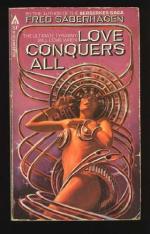* * * * *
Simply because I myself am not impressed by a book, I have no authority to brand anyone who does not like it as a poseur and say that he is only making believe that he likes it. And there must be a great many highly literary people who really and sincerely do think that Senor Blasco’s books are the finest novels of the epoch.
It would therefore be presumptuous of me to say that Spain is now, for the first time since before 1898, in a position to kid the United States and, vicariously through watching her famous son count his royalties and gate receipts, to feel avenged for the loss of her islands. If America has found something superfine in Ibanez that his countrymen have missed, then America is of course to be congratulated and not kidded.
But probably no one was more surprised than Blasco when he suddenly found himself a lion in our literary arena instead of in his accustomed role of bull in his home ring. And those who know say that you could have knocked his compatriots over with a feather when the news came that old man Ibanez’s son had made good in the United States to the extent of something like five hundred million pesetas.
For, like the prophet whom some one was telling about, Ibanez was not known at home as a particularly hot tamale. But, then, he never had such a persistent publisher in Spain, and book-advertising is not the art there that it is in America. When the final accounting of the great success of “The Four Horsemen of the Apocalypse” in this country is taken, honorable mention must be made of the man at the E.P. Dutton & Co. store who had charge of the advertising.
* * * * *
The great Spanish novelist was in the French propaganda service during the war. It was his job to make Germany unpopular in Spanish. “The Four Horsemen of the Apocalypse” is obviously propaganda, and not particularly subtle propaganda either. Certain chapters might have come direct from our own Creel committee, and one may still be true to the Allied cause and yet maintain that propaganda and literature do not mix with any degree of illusion.
There is no question, of course, that those chapters in the book which are descriptive of the advance and subsequent retreat of the German troops under the eye of Don Marcelo are masterpieces of descriptive reporting. But Philip Gibbs has given us a whole book of masterpieces of descriptive reporting which do not bear the stamp of approval of the official propaganda bureau. And, furthermore, Philip Gibbs does not wear a sport shirt open at the neck. At least, he never had his picture taken that way.
As for the rest of the books that were dragged out from the Spanish for “storehouse” when “The Four Horsemen” romped in winners, I can speak only as I would speak of “The World’s Most Famous Battles” or “Heroines in Shakespeare.” I have looked them over. I gave “Mare Nostrum” a great deal of my very valuable time because the advertisements spoke so highly of it. “Woman Triumphant” took less time because I decided to stop earlier in the book. “Blood and Sand” I passed up, having once seen a Madrid bull-fight for myself, which may account for this nasty attitude I have toward any Spanish product. I am told, however, that this is the best of them all.




